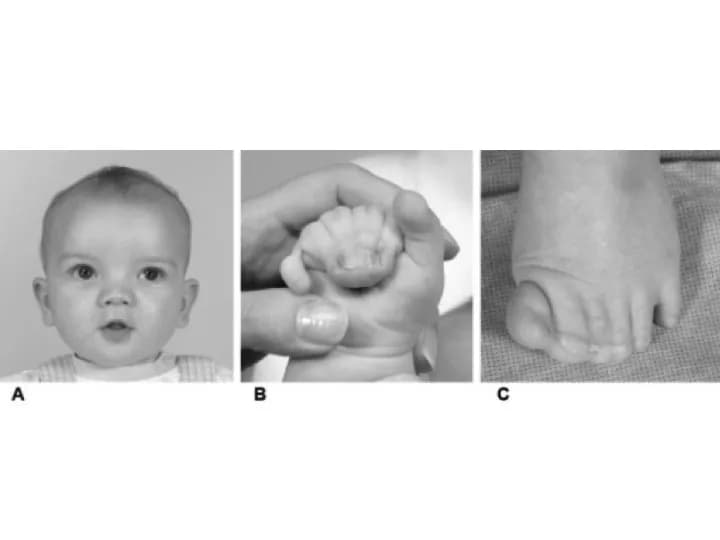What are the other Names for this Condition? (Also known as/Synonyms)
- GCPS (Greig Cephalopolysyndactyly Syndrome)
- Greig Type Polysyndactyly-Dysmorphic Craniofacies
- Polysyndactyly with Peculiar Skull Shape
What is Greig Cephalopolysyndactyly Syndrome? (Definition/Background Information)
- Greig Cephalopolysyndactyly Syndrome (GCPS) is a very rare genetic disorder that is caused by mutation in the GLI3 gene. It may be manifested at birth
- The signs and symptoms of GCPS may include growth abnormalities of the hands and feet (including fingers and toes), seizures, and poor mental growth
- Surgical correction of limb deformities and supportive therapy may be provided as treatment measures to help the affected individuals cope with Greig Cephalopolysyndactyly Syndrome
- The prognosis of Greig Cephalopolysyndactyly Syndrome is dependent upon several factors including its severity; nevertheless, the outcome is generally good
Who gets Greig Cephalopolysyndactyly Syndrome? (Age and Sex Distribution)
- Greig Cephalopolysyndactyly Syndrome is an infrequent congenital condition, which may be present at birth
- Both male and female genders are prone to this disorder
- All racial and ethnic groups may be affected
What are the Risk Factors for Greig Cephalopolysyndactyly Syndrome? (Predisposing Factors)
- Greig Cephalopolysyndactyly Syndrome is transmitted genetically from the parents to their offspring; hence those with a family history of GCPS are at a high risk
It is important to note that having a risk factor does not mean that one will get the condition. A risk factor increases ones chances of getting a condition compared to an individual without the risk factors. Some risk factors are more important than others.
Also, not having a risk factor does not mean that an individual will not get the condition. It is always important to discuss the effect of risk factors with your healthcare provider.
What are the Causes of Greig Cephalopolysyndactyly Syndrome? (Etiology)
- Greig Cephalopolysyndactyly Syndrome is a genetic disorder that is inherited in an autosomal dominant pattern
- In this disorder, there are genetic mutations in the GLI3 gene, which is responsible for the production of a certain type of protein. Anomalies in the production of this protein leads up to the characteristic signs and symptoms of GCPS
- Not all cases may be inherited from the family, for some are known to occur sporadically
Autosomal dominant: Autosomal dominant conditions are traits or disorders that are present when only one copy of the mutation is inherited on a non-sex chromosome. In these types of conditions, the individual has one normal copy and one mutant copy of the gene. The abnormal gene dominates, masking the effects of the correctly functioning gene. If an individual has an autosomal dominant condition, the chance of passing the abnormal gene on to their offspring is 50%. Children, who do not inherit the abnormal gene, will not develop the condition or pass it on to their offspring.
What are the Signs and Symptoms of Greig Cephalopolysyndactyly Syndrome?
Some individuals may have mild symptoms, while in others it may be very severe. The signs and symptoms of Greig Cephalopolysyndactyly Syndrome may include:
- Hands and feet related: Extra fingers or toes, large thumb, large big toe, joining of fingers and toes causing webbed hand and feet
- Large head with prominent forehead
- Decreased IQ level
- Seizures
- Developmental delays in the baby
How is Greig Cephalopolysyndactyly Syndrome Diagnosed?
Diagnostic tests that are performed for Greig Cephalopolysyndactyly Syndrome may include:
- Complete physical examination with thorough evaluation of medical history (including family history)
- CT, MRI scan of the affected region
- Genetic tests and analysis to detect mutations
- Prenatal exams include amniocentesis and chorionic villus sampling
Many clinical conditions may have similar signs and symptoms. Your healthcare provider may perform additional tests to rule out other clinical conditions to arrive at a definitive diagnosis.
What are the possible Complications of Greig Cephalopolysyndactyly Syndrome?
Complications due to Greig Cephalopolysyndactyly Syndrome may include:
- Severe neurological disorders: Mental retardation, epileptic seizures, abnormal head growth
- Physical growth and development delays
- Umbilical and diaphragmatic hernia
How is Greig Cephalopolysyndactyly Syndrome Treated?
An early, individualized, and often symptomatic treatment plan is required to manage Greig Cephalopolysyndactyly Syndrome, which may include:
- Surgical correction (plastic, orthopedic surgery) of hand and feet abnormalities, to improve functionality and enhance their aesthetics
- Children with developmental delays are treated based on individual assessment and missed growth milestones
- For improving motor skills and mental disabilities, special therapeutic treatment (by speech, physical and occupational therapists) and supportive care is provided
- Medications, such as antiseizure drugs, are used for epileptic seizures
How can Greig Cephalopolysyndactyly Syndrome be Prevented?
- Currently, there are no specific methods or guidelines to prevent Greig Cephalopolysyndactyly Syndrome, since it is a genetic condition
- Genetic testing of the expecting parents (and related family members) and prenatal diagnosis (molecular testing of the fetus during pregnancy) may help in understanding the risks better during pregnancy
- If there is a family history of the condition, then genetic counseling will help assess risks, before planning for a child
- Active research is currently being performed to explore the possibilities for treatment and prevention of inherited and acquired genetic disorders such as GCPS
- Regular medical screening at periodic intervals with tests, and physical examinations are mandatory
What is the Prognosis of Greig Cephalopolysyndactyly Syndrome? (Outcomes/Resolutions)
- With timely and active treatment administration; Greig Cephalopolysyndactyly Syndrome can be effectively managed and controlled, provided neurological impairment is not severe
- Most individuals can lead a normal healthy life, and the prognosis is generally good
Additional and Relevant Useful Information for Greig Cephalopolysyndactyly Syndrome:
An error in gene (GLI3 gene) mutation leading to the defective production of a protein by the body causes Pallister-Hall syndrome. This is the same gene that also causes GCPS.
Related Articles
Test Your Knowledge
Asked by users
Related Centers
Related Specialties
Related Physicians
Related Procedures
Related Resources
Join DoveHubs
and connect with fellow professionals


0 Comments
Please log in to post a comment.